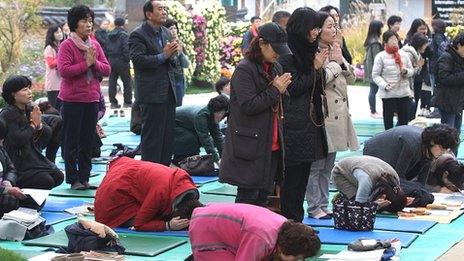UK education sixth in global ranking
- Published
- comments

Parents in South Korea, earlier this month, pray for their children's exam results
The UK's education system is ranked sixth best in the developed world, according to a global league table published by education firm Pearson.
The first and second places are taken by Finland and South Korea.
The rankings combine international test results and data such as graduation rates between 2006 and 2010.
Sir Michael Barber, Pearson's chief education adviser, says successful countries give teachers a high status and have a "culture" of education.
International comparisons in education have become increasingly significant - and this latest league table is based upon a series of global test results combined with measures of education systems, such as how many people go on to university.
This composite picture puts the UK in a stronger position than the influential Pisa tests from the Organisation for Economic Co-operation and Development (OECD) - which is also one of the tests included in this ranking.
The weightings for the rankings have been produced for Pearson by the Economist Intelligence Unit.
Global competition
The two education superpowers - Finland and South Korea - are followed by three other high-performing Asian education systems - Hong Kong, Japan and Singapore.
The UK - which is considered as a single system, rather than four devolved administrations - is then ranked at the head of an above-average group including the Netherlands, New Zealand, Canada and Ireland.
These are ahead of a middle-ranking group including the United States, Germany and France.
At the lowest end are Mexico, Brazil and Indonesia.
These comparisons draw upon tests that are taken every three or four years, in areas such as maths, science and literacy - and so present a picture lagging by several years.
But the intention is to provide a more multi-dimensional view of educational achievement - and create a databank which will be updated, in a project that Pearson is calling the Learning Curve.
Looking at education systems that succeed, the study concludes that spending is important, but not as much as having a culture that is supportive of learning.
It says that spending is easier to measure, but the more complex impact of a society's attitude to education can make a big difference.
The success of Asian countries in these rankings reflects the high value attached to education and the expectations of parents. This can continue to be a factor when families migrate to other countries, says the report accompanying the rankings.
Looking at the two top countries - Finland and South Korea - the report says that there are many big differences, but the common factor is a shared social belief in the importance of education and its "underlying moral purpose".
Teacher quality
The report also emphasises the importance of high-quality teachers and the need to find ways to recruit the best staff. This might be about status and professional respect as well as levels of pay.
The rankings show that there is no clear link between higher relative pay and higher performance.
And there are direct economic consequences of high and low performing education systems, the study says, particularly in a globalised, skill-based economy.
But there are less straightforward and conflicting messages about how schools are organised.
The ranking for levels of school choice shows that Finland and South Korea have among the lowest levels of school choice. But Singapore, another high performer, has the highest level. The UK is among the upper levels in terms of school choice.
'Significant' data
Higher levels of school autonomy are a characteristic of many higher performing systems - headed by China, the Netherlands, the UK and Hong Kong (which is considered as a separate school system in such education rankings).
But Finland, the most successful system, has a relatively low level of school autonomy.
Sir Michael Barber, a former adviser to Tony Blair, said that the gathering of this information was the "start of something significant" - providing a practical resource for policy makers wanting to learn from other countries.
In terms of the UK's performance, he said it fitted into the view that education standards had risen at the end of the 1990s and into the early 2000s and had then levelled off.
Labour's education spokesman Stephen Twigg said the findings reflected the achievements of the previous government.
"This report shows that after 13 years of investment and reform with Labour, schools in the UK are amongst the best in the world."
And he said the findings did not provide evidence for the current government's support for free schools.
"This shows there is much more to school performance than structures," said Mr Twigg.
A Department for Education spokeswoman said: "We are driving up standards right across the board by bringing the best graduates into teaching, developing a world-class curriculum, and restoring order to our classrooms.
"We are driving forward the academies and free schools programmes with more than half of secondary schools now enjoying academy status.
"We have introduced the EBacc so more pupils are encouraged to study the core academic subjects that universities and employers demand and we will be introducing a new, far more rigorous examination system."
- Published27 November 2012
- Published9 May 2012
- Published27 November 2012
- Published7 December 2010
- Published11 July 2012
- Published13 June 2012
- Published2 March 2011